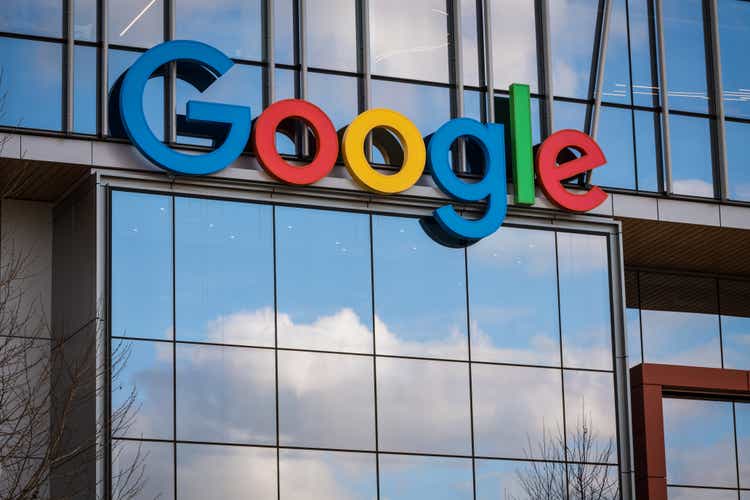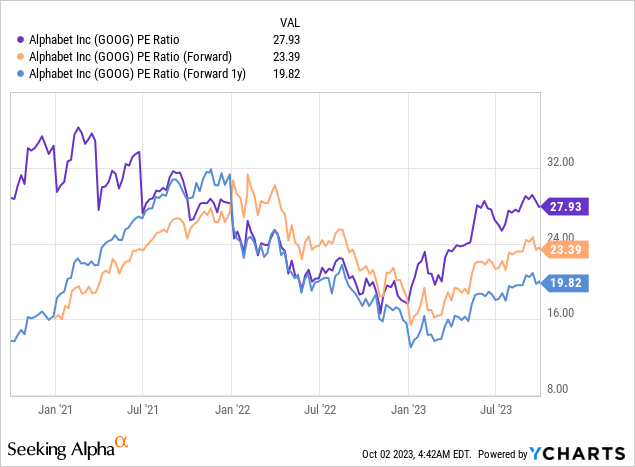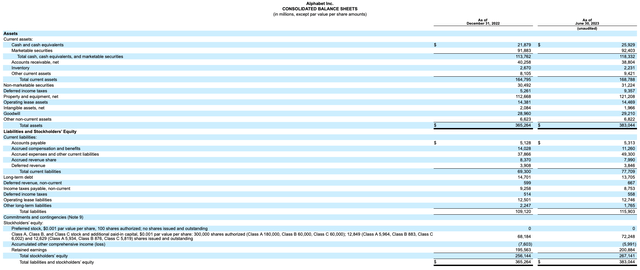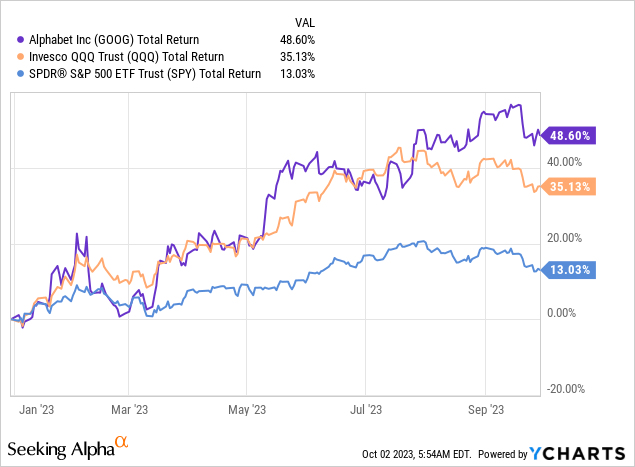Summary:
- Google has recently been sued by the Justice Department for allegedly engaging in monopolistic and anticompetitive behaviors.
- We believe that investors should not be worried about this litigation.
- Google is a high quality business with a massive user base and a pristine balance sheet.
- Google appears to be fundamentally undervalued and we view weakness as an opportunity for long-term investors to add more shares.
400tmax
Thesis
Google (NASDAQ:GOOG) has long been the target of fines and lawsuits from governments around the world. Now the company is being sued by the Justice Department on monopoly concerns. Despite this, we believe that the company remains a buy on a fundamental basis. Additionally, a breakup could ultimately be value accretive for shareholders.
Antitrust Case
The Justice Department has officially sued Google for allegedly “monopolizing digital advertising technologies”. In short, the lawsuit alleges that Google has suppressed competition in the digital advertising market through anticompetitive and exclusionary conduct.
The Justice Department states:
To redress Google’s anticompetitive conduct, the Department seeks both equitable relief on behalf of the American public as well as treble damages for losses sustained by federal government agencies that overpaid for web display advertising.
It’s also possible that the government pushes for a breakup of the company. We will let the lawyers argue the merits of both this case and the 2020 Justice Department lawsuit regarding search. Our thesis is centered on the belief that the company is a buy here regardless of the outcome of ongoing litigation.
The Business
Google’s business can be broken up into three main categories.
Google Services – This segment is by far the largest and encompasses Google’s search business, YouTube ads, Android/hardware, and Google Ad Network.
Google Cloud – This segment encompasses Google Cloud Platform services, Google Workspace communication and collaboration tools, and other enterprise services.
Other Bets – This segment refers to Google’s “moonshot” projects.
While Google derives most of their revenue from advertising, the company has many potential growth engines in enterprise and some of their moonshots could finally pay off. This makes the company a reasonable growth pick even if their ad business faces economic/regulatory headwinds.
We believe that YouTube is the most valuable media asset on the planet and there may be additional ways to monetize the site in the future. At its core, YouTube is a content service where Google doesn’t have to pay for any of the content itself, instead rewarding content creators with a share of the ad revenue. This is a business model that any of the streaming companies would love to have and gives YouTube an advantage in both longevity and profitability. While most social media sites all have their day in the sun and eventually fade in popularity, YouTube has no real competitor. Importantly, the nature of the site means that as time goes on their content library becomes larger and the network effects continue to grow stronger. It seems unlikely that a relevant YouTube competitor will arrive anytime soon, and actually moving people away from YouTube would be a herculean effort. There are a few mega-cap tech companies that may be able to pull it off, but they probably won’t even try given how difficult the task would be.
In the event that the company gets broken up, we believe that it would ultimately be value accretive for shareholders over the long-term. Many of their business units can stand on their own and a breakup would help to reduce the lack of innovation that eventually plagues large tech companies. While there are also efficiencies that would be lost as a result of a breakup, the trade-off seems favorable in our mind.
For these reasons, we believe that antitrust is a non-factor. If the company gets fined and continues business as usual, there are adequate growth engines in place. If the company gets broken up, the value of the individual pieces could exceed the potential value of the combined entity over the long-term.
Valuation
Google appears to be trading at an attractive valuation considering their fundamental prospects. A forward PE of 23 is too low for a company of this caliber, especially given the size of their user base and pristine balance sheet. Google has just $13 billion of long-term debt and a large cash/cash equivalents balance of over $110 billion. For a tech company with such a massive user base and profitable business model, the market is discounting a lot of pessimism into the shares. While some of this discount is warranted, we believe that the stock should trade closer to a forward PE ratio of 30. While this may seem high, it’s important to consider just how dominant Google is. The company has billions of users and a business model that is highly lucrative (for the time being). Given how entrenched the company is in the daily lives of many people, it’s likely that they will find additional ways to monetize their user base even if their core ads business faces headwinds. The company can continue to grow in their enterprise segment, and their massive user base and the data they generate will likely become incrementally more valuable as AI applications become more widespread.

Google’s Balance Sheet (Google Q2 Earnings Report)
Price Action
Google has beaten both the Nasdaq 100 and S&P 500 so far this year. Given the fundamental picture, we believe that this outperformance can continue over the coming years.

Risks
One risk to the bullish thesis for Google is the potential for them to lose significant market share in their search and advertising businesses. This would pressure their profitability and could cause investors to exit the stock in droves, at least in the short-term.
Another risk is that regulatory actions damage the business model of Google so much that the business is permanently impaired. While a breakup of the company would be an acceptable outcome for shareholders, the real risk is if some sort of government action taken to enhance societal wellbeing damages the fundamentals of their business on a more permanent basis (instead of fines etc).
We view the risk/reward as being attractive at these levels and see weakness as an opportunity for long-term investors to buy more shares.
Key Takeaway
Regardless of what happens on the antitrust front, Google is a business that has multiple growth levers to pull. We believe that a breakup of the company would be fine for shareholders. Google appears to be undervalued on a fundamental basis and we believe weakness can be used by long-term investors to pick up more shares.
Thanks for taking the time to read this article!
Today’s question for the comments is: would you rather buy Google or Meta here and why?
Let us know your thoughts in the comments below.
Analyst’s Disclosure: I/we have a beneficial long position in the shares of GOOGL either through stock ownership, options, or other derivatives. I wrote this article myself, and it expresses my own opinions. I am not receiving compensation for it (other than from Seeking Alpha). I have no business relationship with any company whose stock is mentioned in this article.
UFD Capital Value Fund, LP has long exposure to GOOGL. UFD Capital, LLC manages a hedge fund and does not provide investment advice. Nothing contained in this article is investment advice or financial advice of any kind and investors should do their own research and consult a professional before making financial decisions. Nothing contained in this article should be interpreted as a solicitation to buy or an offer to sell securities.
Seeking Alpha’s Disclosure: Past performance is no guarantee of future results. No recommendation or advice is being given as to whether any investment is suitable for a particular investor. Any views or opinions expressed above may not reflect those of Seeking Alpha as a whole. Seeking Alpha is not a licensed securities dealer, broker or US investment adviser or investment bank. Our analysts are third party authors that include both professional investors and individual investors who may not be licensed or certified by any institute or regulatory body.
